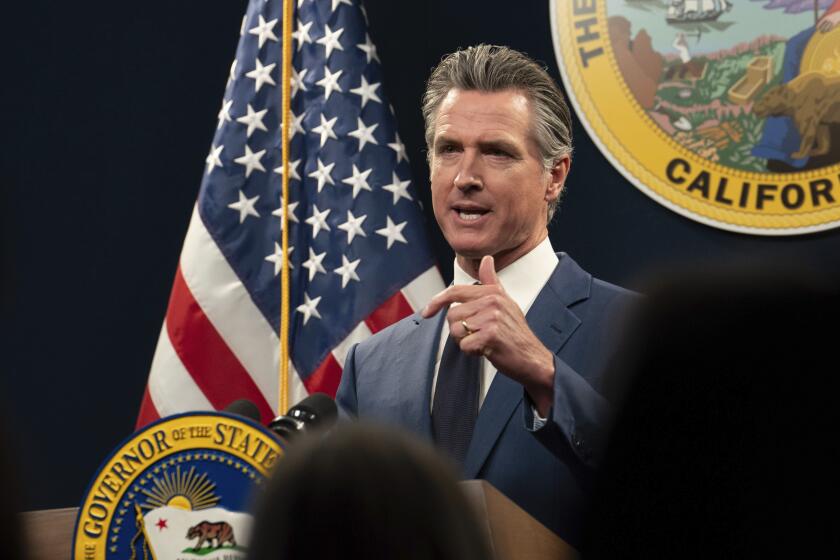Davis Has a Lot to Say When Signing Bills
Attention, pet food companies: Gov. Gray Davis wants you to contribute your product to California seeing-eye dogs.
If you do, Davis promises to publicize your generosity on his Web site.
Memo to school districts: If you missed the deadline for filing to receive state library funds, be forewarned. The governor bailed you out this time by signing a $1-million relief bill, but said he will not do it again.
Heads up, environmentalists: The governor signed legislation requiring development of a master plan to better manage California’s stressed marine resources. But he also asked the Department of Fish and Game and supporters of the bill to find “private resources” to pay for it.
After almost 10 months in office, Democrat Davis has added another step to the legislative process. It is no longer enough just to sign or veto bills that come to his desk.
Instead, Davis, famous for his micro-managing style, regularly sends the signed bills out with comments, warnings, scoldings and even demands that new laws be passed to correct the errors he perceives in the ones he just signed.
These statements are not binding on legislators, but they invoke an honor system in which the lawmaker commits to keeping up his or her end of the bargain.
This new dimension of the bully pulpit marks a somewhat radical departure from his three immediate predecessors: Democrat Jerry Brown and Republicans George Deukmejian and Pete Wilson. Those governors routinely issued laundry list announcements of bills they had signed, but rarely with accompanying commentary.
For bills they were particularly proud of, those governors papered California with news releases and staged bill-signing ceremonies. Davis adheres to that tradition.
But in the past few weeks, Davis has added an extra twist: He writes reams of special letters to the Legislature highlighting bills he has signed, a practice his predecessors only rarely used. He also sends copies to the news media.
Typically, Davis’ letters spell out a policy position, raise a warning, disclose an agreement for a corrective bill next session, or, in the case of the dog food message, propose an extraordinary deal.
Under a new law signed by Davis, the state will provide $35 a month to about 150 blind, deaf and other disabled citizens who depend on trained dogs for assistance in daily activities.
These Californians receive disability insurance benefits from Social Security, but no additional payments for the care and maintenance of their dogs. Similarly situated low-income recipients in other assistance programs get $50 a month for their service animals.
Davis not only signed the bill (SB 858) by Sen. Teresa Hughes (D-Inglewood), but he also issued a letter. He said he was “very surprised to discover that dog food manufacturers were not donating their product to low-income persons who need service dogs.”
The governor promised to contact every major pet food company and urge them to contribute “their product for the feeding of these noble animals.” He said he will publicize participating companies on his Web site.
In other cases, the governor expressed “concerns” about bills but signed them into law anyway, explaining that the author had “agreed” to carry a remedial measure next session to fix the part that troubled him.
In a typical letter, Davis said he signed an education bill (AB 56) by Assemblywoman Kerri Mazzoni (D-San Rafael) because she “assured me that she will provide cleanup legislation.”
Conversely, the implicit message is clear: If the author refuses, a veto will be forthcoming.
“I think of it as a courtesy,” Mazzoni said. “I’m very willing to do that. . . . The alternative is a veto.”
In previous administrations, governors often sent warnings of their concerns that led to negotiated compromises. Wilson allowed lawmakers to recall bills from his desk so changes could be made.
“Gov. Wilson was always very clear and up front,” said Assemblyman Martin Gallegos (D-Baldwin Park), who said he twice challenged Wilson’s threat to veto health care reform bills and lost.
After a two-year struggle, Gallegos finally put a bill on Davis’ desk requiring new school buses to be equipped with lap and shoulder belts, starting in 2002. But a federal safety study subsequently recommended against adopting such restraints because they offer no extra safety. The federal government is expected to announce new national standards next year.
Davis signed Gallegos’ bill anyway. But first he reached an agreement with Gallegos for a bill next session that would conform California’s new law to the federal standards, whatever they may be. The bill may also seek to delay California’s law beyond 2002.
“I think the governor was saying, ‘We agree with the concept. But we have concerns. If you are willing to address those concerns in follow-up legislation, it saves a veto.’ That makes sense. It’s fair,” Gallegos said.
But in a capital where Democrats occupy the governor’s office and both chambers for the first time since 1982, Davis’ practice of approving laws based on agreements to fix them next session has raised eyebrows.
“From Gov. Wilson’s perspective, a bad law was a bad law,” said former Wilson press secretary Sean Walsh. “In our veto messages, we explained what was needed to get the bill signed.”
Walsh, now a consultant to business interests, said creating a law conditioned on an arrangement for remedial legislation later may create situations which a governor or special interest would try to exploit.
(BEGIN TEXT OF INFOBOX / INFOGRAPHIC)
A New Bully Pulpit
Gov. Gray Davis has been issuing comments, warnings, scoldings, even demands about some legislation he signs. This letter exhorts dog food makers to donate their products for service dogs.
More to Read
Get the L.A. Times Politics newsletter
Deeply reported insights into legislation, politics and policy from Sacramento, Washington and beyond. In your inbox three times per week.
You may occasionally receive promotional content from the Los Angeles Times.






